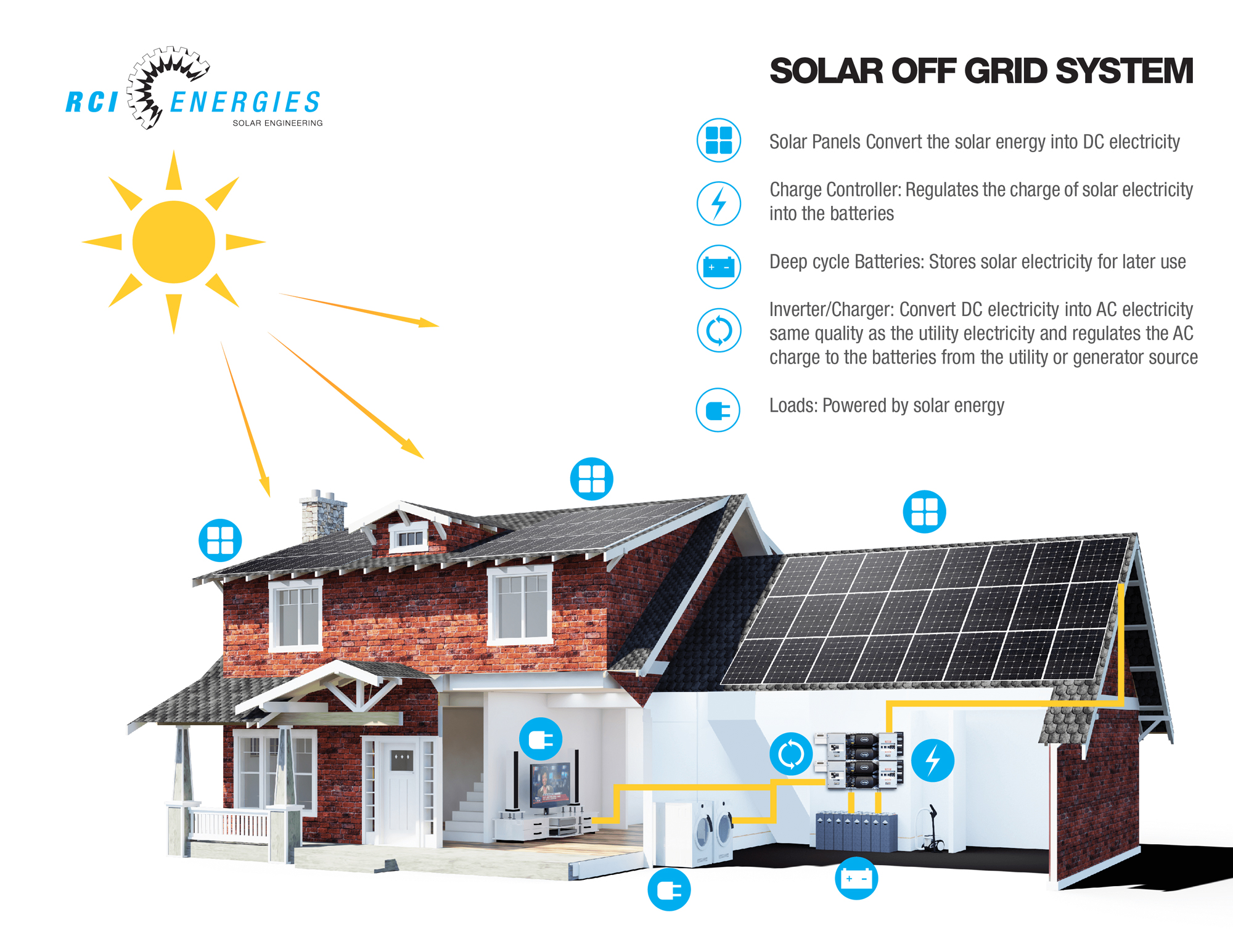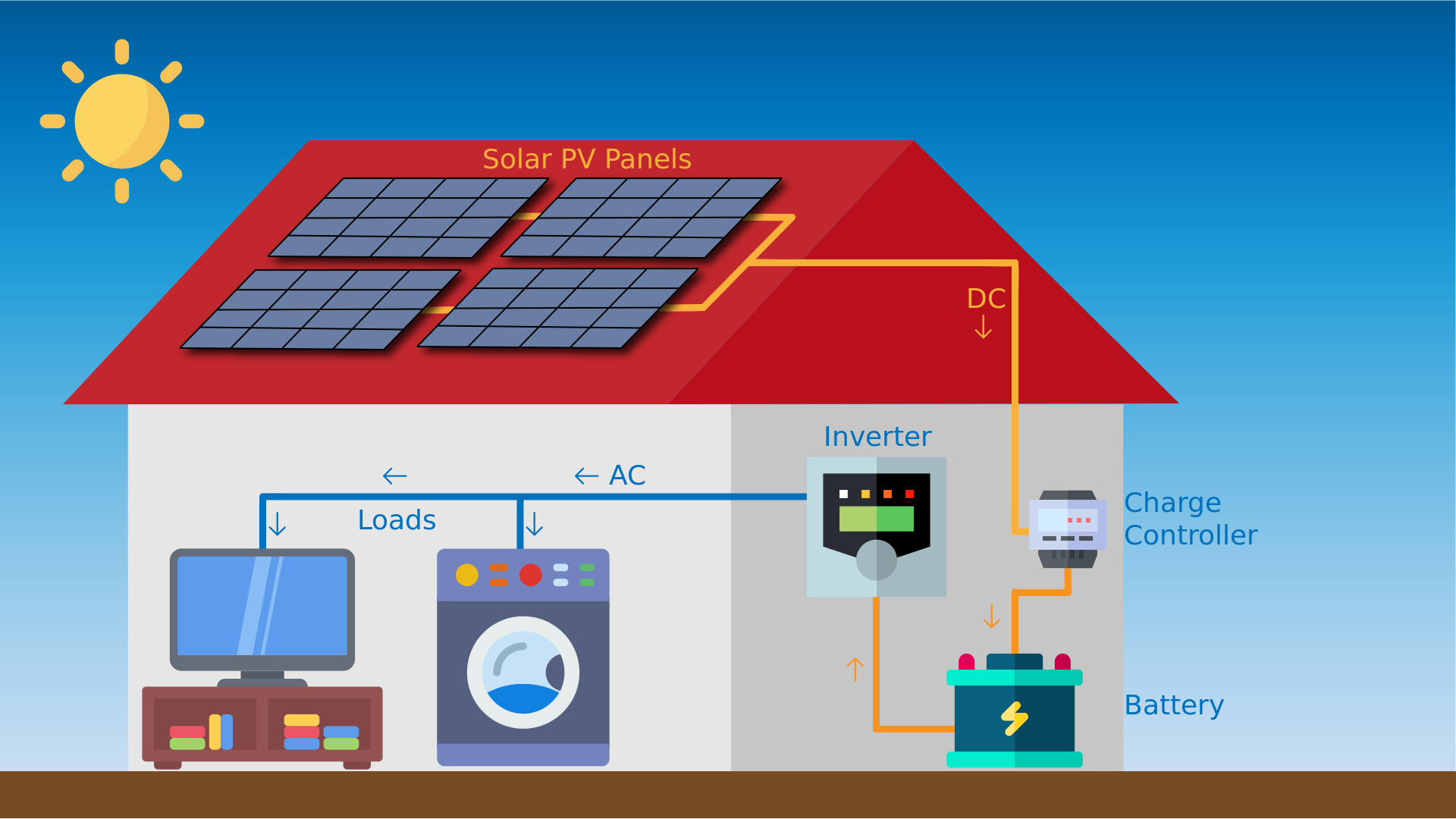What is off grid solar power – What is off-grid solar power? It’s a transformative technology that empowers individuals and communities to harness the sun’s energy, providing a clean, reliable, and sustainable alternative to traditional grid-tied systems. By embracing off-grid solar power, we unlock energy independence, reduce our environmental footprint, and pave the way for a more resilient and sustainable future.
From remote cabins to disaster-prone areas, off-grid solar power offers a versatile solution for diverse energy needs. Its ability to generate electricity without relying on external grids makes it an ideal choice for those seeking energy autonomy and a reduced reliance on fossil fuels.
Define Off-Grid Solar Power
Off-grid solar power systems are stand-alone systems that generate electricity from the sun and store it for later use. They are not connected to the electrical grid and are typically used in remote areas or where grid access is unreliable or unavailable.
Off-grid solar power systems typically consist of the following components:
- Solar panels: These convert sunlight into electricity.
- Batteries: These store the electricity generated by the solar panels.
- Charge controller: This regulates the flow of electricity between the solar panels and the batteries.
- Inverter: This converts the DC electricity from the batteries into AC electricity that can be used by appliances and devices.
Off-grid solar power systems can be used for a variety of applications, including:
- Homes
- Businesses
- RV’s and boats
- Remote cabins
- Disaster relief
Advantages and Disadvantages of Off-Grid Solar Power
Off-grid solar power systems offer numerous advantages and disadvantages. Understanding these factors can help individuals make informed decisions about whether off-grid solar is suitable for their needs.
Advantages:
Energy Independence
Off-grid solar systems provide energy independence, freeing users from reliance on the traditional electrical grid. This can be particularly beneficial in remote areas or during grid outages.
Environmental Friendliness
Solar power is a renewable energy source that does not produce greenhouse gases or other pollutants. By utilizing off-grid solar systems, individuals can reduce their carbon footprint and contribute to a cleaner environment.
Disadvantages:
High Upfront Costs
The initial investment in an off-grid solar system can be substantial, including the cost of solar panels, batteries, inverters, and installation.
Weather Dependency
Solar power generation is dependent on sunlight, which can vary depending on weather conditions. During periods of low sunlight, such as cloudy days or at night, off-grid solar systems may not be able to meet all of a user’s energy needs.
| Advantages | Disadvantages |
|---|---|
| Energy independence | High upfront costs |
| Environmental friendliness | Weather dependency |
Design Considerations for Off-Grid Solar Power Systems
Designing an off-grid solar power system requires careful consideration of several factors to ensure it meets the specific energy needs and operates efficiently. This section Artikels the key design considerations and provides a step-by-step guide to designing an off-grid solar power system.
The design process involves determining the energy consumption, calculating the system size, and selecting appropriate battery storage. These considerations are crucial for ensuring the system can reliably power the intended loads and maintain a stable power supply.
Do not overlook explore the latest data about how to start living off the land.
Energy Consumption Assessment
Accurately assessing the energy consumption of the intended loads is essential for determining the size of the solar array and battery bank. This involves identifying all appliances, devices, and equipment that will be powered by the system and calculating their daily and monthly energy usage.
Detailed energy audits or monitoring can provide accurate data for this assessment.
System Size Calculation
Based on the energy consumption assessment, the size of the solar array and battery bank can be calculated. The solar array size is determined by the amount of energy required and the available sunlight in the location. The battery bank size is determined by the amount of energy that needs to be stored to cover periods of low sunlight or high energy demand.
Battery Storage Selection
Choosing the appropriate battery storage is crucial for ensuring the system can reliably power loads during periods of low sunlight. Factors to consider include battery capacity, depth of discharge, cycle life, and maintenance requirements. Different battery technologies, such as lead-acid, lithium-ion, and flow batteries, offer varying characteristics and are suitable for different applications.
Step-by-Step Design Guide
- Determine the energy consumption of the intended loads.
- Calculate the size of the solar array based on energy consumption and sunlight availability.
- Select the appropriate battery storage based on capacity, depth of discharge, cycle life, and maintenance requirements.
- Design the system layout, including the placement of solar panels, battery bank, and other components.
- Install and connect the system components according to the design.
- Monitor and maintain the system to ensure optimal performance and longevity.
The design process can be further illustrated using a flowchart:
[Flowchart illustrating the design process for off-grid solar power systems]
Check sustainable travel jobs to inspect complete evaluations and testimonials from users.
By following these design considerations and steps, you can create an off-grid solar power system that meets your specific energy needs and operates efficiently.
Installation and Maintenance of Off-Grid Solar Power Systems: What Is Off Grid Solar Power
Installing and maintaining an off-grid solar power system involves several crucial steps and considerations to ensure optimal performance and safety. This section will delve into the process of installing an off-grid solar system, highlighting important safety precautions and best practices.
Obtain direct knowledge about the efficiency of eco travel companies through case studies.
Additionally, it will cover the ongoing maintenance requirements to keep the system functioning efficiently.
Steps Involved in Installing an Off-Grid Solar Power System, What is off grid solar power
- Site Assessment:Determine the location and orientation of the solar panels, considering factors such as sunlight exposure, shading, and roof integrity.
- System Design:Calculate the energy needs of the household or business, and design the system accordingly, including the number and capacity of solar panels, battery storage, and other components.
- Permitting and Inspection:Obtain necessary permits and inspections from local authorities to ensure compliance with building codes and safety regulations.
- Equipment Procurement:Source high-quality solar panels, batteries, inverters, and other components from reputable manufacturers.
- Installation:Mount the solar panels securely on the roof or ground-mounted system, connect the electrical components, and commission the system.
Safety Precautions and Best Practices for Installation
- Wear appropriate personal protective equipment (PPE) such as gloves, safety glasses, and a hard hat.
- Follow manufacturer’s instructions carefully for all components and equipment.
- Use proper grounding techniques to prevent electrical hazards.
- Secure all electrical connections tightly to prevent arcing or overheating.
- Have the system inspected by a qualified electrician before connecting it to the grid.
Ongoing Maintenance Requirements
Regular maintenance is essential to ensure the longevity and efficiency of an off-grid solar power system. This includes:
- Cleaning:Regularly clean solar panels to remove dirt, debris, or snow accumulation that can reduce power generation.
- Monitoring:Monitor the system’s performance through a monitoring system or by observing energy production data to identify any potential issues.
- Battery Maintenance:Check battery levels regularly and replace batteries as needed to maintain optimal storage capacity.
- Electrical Inspection:Have the system inspected by a qualified electrician periodically to check for any electrical faults or loose connections.
- Software Updates:If applicable, keep the system’s software up to date to ensure optimal performance and compatibility with new technologies.
Applications and Case Studies of Off-Grid Solar Power
Off-grid solar power systems find applications in various settings where grid electricity is unavailable or unreliable. These include remote homes, recreational vehicles (RVs), and emergency backup systems.
You also can understand valuable knowledge by exploring ecotourism in sikkim.
Remote Homes
Off-grid solar power systems provide a reliable and sustainable energy source for homes located in remote areas, far from the electrical grid. These systems typically consist of solar panels, batteries, and an inverter to convert DC power to AC power for appliances and devices.
RVs
RVs equipped with off-grid solar power systems allow for extended off-grid camping and travel. These systems provide electricity for lighting, appliances, and charging devices, enabling campers to enjoy the outdoors without relying on external power sources.
Emergency Backup
Off-grid solar power systems serve as a backup during grid outages, providing essential power for critical appliances and devices. These systems can be installed in homes, businesses, and emergency shelters, ensuring continuity of operations during power failures.
Case Studies
Numerous successful off-grid solar power installations demonstrate the effectiveness and benefits of these systems. Here are a few notable case studies:
- Remote Alaskan Home:A remote home in Alaska relies solely on an off-grid solar power system, providing electricity for all appliances, lighting, and heating.
- RV Solar Setup:An RV owner installed a comprehensive off-grid solar power system, enabling extended off-grid camping trips with ample power for all necessities.
- Emergency Backup System:A hospital in a hurricane-prone area installed an off-grid solar power system as a backup, ensuring critical medical equipment and lighting remained operational during power outages.
Testimonials
Users of off-grid solar power systems often express their satisfaction and the positive impact it has on their lives:
“Our off-grid solar power system has given us peace of mind and independence. We no longer have to worry about power outages or rising energy costs.”
John, Remote Homeowner
“With our RV solar setup, we can explore remote destinations and enjoy the outdoors without sacrificing comfort or convenience.”
Mary, RV Owner
“During the last hurricane, our hospital’s off-grid solar power system was a lifesaver, ensuring that critical patient care continued uninterrupted.”Dr. Smith, Hospital Administrator
Ending Remarks
In conclusion, what is off-grid solar power? It’s a beacon of sustainability, resilience, and energy independence. By harnessing the sun’s boundless energy, we can create a cleaner, more secure, and more equitable energy future. As technology continues to advance and costs decline, off-grid solar power is poised to play an increasingly vital role in our transition to a sustainable and decentralized energy system.
FAQ Overview
What are the benefits of off-grid solar power?
Off-grid solar power offers numerous benefits, including energy independence, reduced environmental impact, lower energy costs, and increased resilience during power outages.
What are the challenges of off-grid solar power?
The primary challenges of off-grid solar power include high upfront costs, weather dependency, and the need for proper system design and maintenance.
Is off-grid solar power right for me?
Whether off-grid solar power is right for you depends on your energy needs, budget, and lifestyle. If you value energy independence, sustainability, and reduced energy costs, off-grid solar power could be a viable option.


